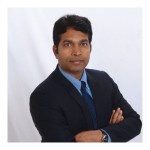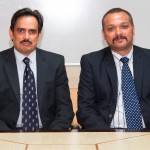Srikanth Muralidhara CoFounded Flutura Decision Sciences & Analytics along with Krishnan Raman. Srikanth did his engineering in 1997 from RVCE Bangalore and joined PSI data systems and was passionately building device drivers for payment networks. He used to write code for all the ATMs and connect it to the banking network and also did quite a bit of work on smart cards which was new at that point on time. This was the best 2.5 years of his experience where in addition to building cutting edge technologies, he also got to interact with customers at a very early stage in his career. That helped him to understand customer sensitivity where he figured out that this is not about product and not about how great you are, but about looking at problems and challenges from a customer perspective and solving those which many people lack. His decision to join a startup at an incubation stage was fulfilled in 2000 when he joined MindTree which was a great startup and was there till 2012. This was the beginning of his tryst with Data and Analytics. There were some good customers who began looking at data during 2000 and wanted to build analytic solutions. This employment gave him an opportunity to learn what was a blue ocean at that point in time.
His other Co-Founders Krishnan comes from PwC who has lots of experience in consulting with Big5 and used to do technology strategy and draw IT roadmap for his customers. Krishnan had pioneered Software as a Service through his startup way back in 1999 but had to wind up because it was way to ahead of its time in the market. Mindtree, at that point in time was one of the first companies to bring Business Analyst as a role and Krishnan headed BA in addition to doing consulting and drawing road map with customers.Derick, on the other hand was a Data architect and great visionary. He was working with AT&T and he had seen a lot of big data in 1999 before the term was coined and he joined MindTree in India. Derick sees things ten years ahead and he made a pitch towards starting a KPO within MindTree ahead of time and was the first KPO business head for MindTree. The three of them worked together as a team and started the analytics division from an incubation stage and grew it to a 35 mn$ business and had also built a team from 0 to 1000 during their stint. A couple of transformational programs was done – Aadhar program where Derick was one of the key member for the fraud analytics portion and that opened their eyes for opportunities in the big data space
The three of them decided to start a company. Passion meting opportunity – Flutura was born.
This was more of a passion to build a company from scratch rather than knowing the exact area in which they are in today – Analytics and BigData area. They started with an Outlet Recommendation Engine which they sold in under developed countries where Retail Kirana stores were the norm than organized retail. It was very difficult for CPG companies to look at their GoToMarket in the fragmented retail space. They understood that problem and built their first prototype. They took their idea to one of their investor in the largest FMCG company in India who got excited about the idea and seed funded them. There was a lot of trust because they had worked in the past.
They did a MVP for the engine and they spoke to quite a few companies and also to a large Systems Integrator firm since they have a big access to CPG companies and leveraged them as the channel partner. They did some joint marketing campaign, but that did not work at that point in time because lots of these CPG companies do not capture the details at the last mile , i.e., Secondary and Tertiary sales information was not getting captured and hence the CPG companies could not figure out how to utilize this. They spent six months without closing any deals. Srikanth says that identifying a great problem in the market which has a large addressable space with a past history of their own experience inhibited their thinking. They did a lot of work for CPG and they wanted to find whitespaces within CPG but there was a lot of competition and the first realization was identifying the white space that is fairly repeatable. This did not work in the CPG space and they had to pivot. They dropped the product.
On the field, they had to start making some revenue and then they started thinking of the experience behind them and they began helping some companies with broken projects in analytics and the first customer was through reference where they know the person. Business now became came very easy as they began building on their experiences and got many projects. They got a large project for NHS UK on predicting effectiveness of treatment in mental health which kept the company alive and buzzing. They began making revenue in two years and scaled pretty well and they started looking at building a product again. They had a chance engagement with a Fortune 10 company in iOT and they began studying the landscape and they realized that there were not many companies that did it. It was a fairly evolving space and they took the bet (on one) and they are glad they did that. They devoted quite a bit of time in validating this problem with customers and listened to the market and that is how they found their niche.
In this project they collected a lot of data from turbines and built a product for a US based customer in Texas which was a pseudo regulatory agency for certifying sea worthiness of ships as the client had a very large fleet and data from sensors and complex information like weather and data connected to ships leading to analyse how to decrease fuel consumption and this led them to think the market needed a platform which helped created data products rapidly. They are in beta of signal studio – a product used to build products in iOT space. Because of this experience, they also chose engineering and energy as their verticals and the obvious choice of geography fell in Texas and they incorporated their US presence there.
From an unknown-unknown situation, they moved into a known–unknown situation where they knew that the laggards like engineering and energy is currently adopting new solutions. They had to figure out how to enter the account and frame their message, pricing model and what would work and what would not. Enterprise sales takes a lot of time and after that, they have to capitalize and grow the organization, so they are focussing on building annuity based revenue and expanding the accounts they are in. They are also leveraging the platform to build as many data products as possibleThey are now a part of SAP focus program and also IBM – to leverage SAP infrastructure to develop products and use SAP and IBM for GoToMarket.
Srikanth’s Advice to early stage startups – Anyone needs to impress the prospect in your first meeting within a minute. It takes a lot of time to synthesise and build an elevator pitch which is sharp. This is not a trivial thing. At the end of the day, the words you say will help the person accept or reject you and the adoption of the idea takes time if the pitch is not good. Finding the problem and the message takes time and it is worth spending the effort. People get passionate about the product and forget the problem and hence you have to think on the problem than the product
Flutura, (http://www.flutura.com/), today is on a path to be a 100 member decision science company having 10 large customers . Launched the product for utilities and they were standing with the biggies in the energy space and they were able to attract their attention. Flutura is the only analytics company sharply focussing in the Energy space and that has led to lots of traction. They have been awarded by Nasscom as the top 5 products in the Analytics space. Recently Bloomberg US – created something called as current state of machine intelligence – landscape for iOT and M2M companies and they have featured them as one of the companies to watch out for globally. They have been funded by Hive.Similar Interviews:
Related posts:
 Have a combination of product and services to cross sell
Have a combination of product and services to cross sell
 Evolve an effective Lead Generation and Prospect Tracking system for empowering your channels
Evolve an effective Lead Generation and Prospect Tracking system for empowering your channels
 Demonstrating excellence at the proposal stage to win the first customer
Demonstrating excellence at the proposal stage to win the first customer
 Deriving Actionable Intelligence from Customers’ Interactions and Transactions to provide Personalized services
Deriving Actionable Intelligence from Customers’ Interactions and Transactions to provide Personalized services


